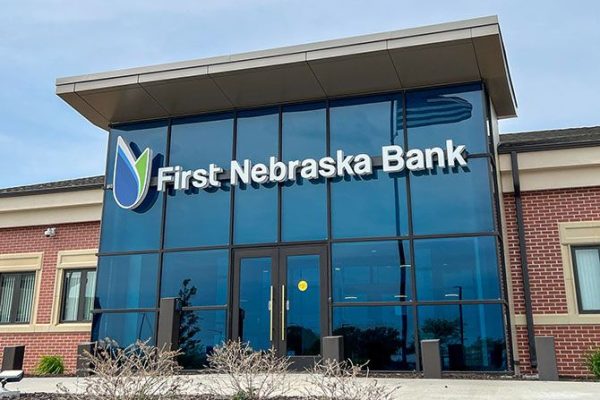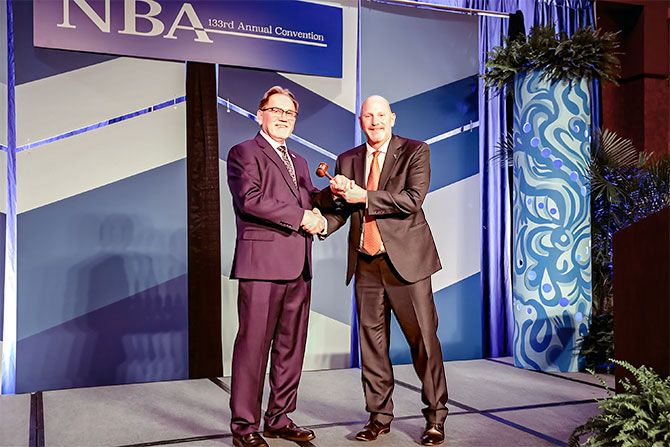
What makes you feel fulfilled? For Lydell “Woody” Woodbury, it’s being able to positively impact those around him. He’s able to do this, in large part, through his career in banking. Woodbury is the Chairman and CEO of First Nebraska Bank and is currently serving a one-year term as Chair of the Nebraska Bankers Association.
Coming from humble beginnings, Woodbury felt that college, much less a career in banking, was not attainable. With six siblings, finances at his home in southwest Minnesota were tight. “What my parents lacked in financial resources, they more than made up for in teaching us about work ethic,” Woodbury said.
Upon graduation, he applied to enter the military. In March of 1977, Woodbury joined the U.S. Army. His training involved managing and scheduling maintenance for the motorized equipment assigned to the units he was attached to. Additionally, he was responsible for ordering and tracking inventory of replacement parts and dispatching vehicles for use by other unit personnel. He completed basic training at Fort Dix, NJ, before moving to Fort Lee, VA, for advanced individual training. Following that, he was assigned to Fort Ord, CA. After 13 months at Fort Ord, he was assigned to the 24th Maintenance Company at Panzer Kaserene, Bobligen, West Germany. After 15 months in Germany, he separated from the Army in the same place his military training began.
Following his honorable discharge, he applied to a two-year accounting program at Pipestone Area Vocational Technical Institute. However, during the interview he was told, “You might have too much personality to be an accountant.” Woodbury took that to mean that he should focus on a career with the opportunity for daily interaction with other people and went across the hall to interview for the ag banking program instead. The rest is history.
“I found out that I really enjoyed the banking aspect of the ag banking program. It was still a two-year program; it still mixed the numbers with other approaches and encouraged interpersonal interactions,” Woodbury said.
He said there are some parallels between the military and banking. There are certain rules you must follow and expectations from those you work with and for. Just like his fellow soldiers expected him to conduct himself with integrity and honor, customers also expect bankers to handle themselves in the same way. “There’s an expectation that you’re going to look after their situations as you would your own,” Woodbury said.
Before the financial crisis in the 1980s, working as a banker brought respect, admiration and opportunity. Woodbury entered the banking industry in 1982. The 1980s were tumultuous for the banking industry, with high inflation, rising interest rates, high energy costs and political turmoil.
“Well, in the ‘80s, you know, [the banks] were vilified. There were other people, other customers that highly respected the banks because they did what was necessary, and it helped protect their business,” Woodbury said.
When the financial crisis hit in 2007 and 2008, banking and bankers once again were portrayed as villains in the media. However, during the crisis, banks were doing everything they could to help their customers stand on steady financial ground. “Community banks were caught up in the backwash of the 2007-2008 investment banking and housing crisis. So they were portrayed in the media as being part of the problem and not as what they really were: the solution to the challenge that was being faced throughout the country,” Woodbury said.
As NBA Chair, Woodbury represents bankers across Nebraska. He desires to give back to the industry that has supported him during his over 40-year career. He intends to accomplish this by advocating for the banking industry at all levels: local, state and national.
At a local level, Woodbury has a passion for connecting with future bankers at the high school and post-secondary education levels. He also speaks to area organizations that seek financial literacy advice. On the state level, he is engaged with Nebraska state senators and regulatory agencies regarding rules and regulations that impact the banking industry. Federally, Woodbury is committed to outreach with elected officials when the opportunities arise, sharing firsthand stories and examples of how proposed and current laws and regulations impact NBA members.
During his term, his main focus is to address the challenges related to the shrinking labor pool and attracting new employees to the industry. “We need to continue to work towards developing a workforce program and recruitment tool that benefits all of our banks throughout our state. We face a challenge in the banking business that’s just like everybody else that owns and operates businesses in the state, and that’s that the labor pool is small. We’ve got to attract people to the industry,” Woodbury said.
To kickstart Woodbury’s goals of attracting new talent to the banking industry, the NBA launched the “Bank on Your Future” initiative this past May to better connect with students of all ages and share the diverse range of career opportunities available within the banking industry. He hopes bankers across the state will mentor students and help them develop the skills and knowledge they need to succeed.
“This challenge is not just a responsibility of senior management or HR — it’s something that every one of us can, and must, contribute to. We can all visit schools to talk about the diverse range of careers. We can mentor students and offer internships to give them a taste of what it’s like to work in our industry. Mentoring and developing the next generation of bankers benefits all of us. It’s time for us to give back to the industry that has given us all so much,” Woodbury said.
Woodbury also commented that bankers are well-positioned to have a positive impact on the communities they serve. And one of the best parts? As a banker, you help people’s dreams come true, which also has a positive impact on your life. And those types of relationships stick with you.
Woodbury distinctly remembers a father-son duo who were First Nebraska Bank customers in financial distress during the mid-1990s. They were in a cattle feeding/farming operation together, but the operation could not support both of them. They asked Woodbury for advice, and he suggested that the father maintain the farming operation while the son got a job in town; then, when the father was ready to retire, the farm would still be there for the son to return to. Woodbury said the father and son implemented the plan he had suggested, and it was working very, very well. Then, the son decided to leave farming and liquidated. Later on, he and his wife looked to purchase a home but experienced difficulties financing it. The father mentioned this to Woodbury, who said to have the son come see him.
“He and his wife came in. I said, ‘Let me help you get through this. Let’s fix this.’ And they said, ‘Well, we didn’t think you’d help us because the bank took a loss when we liquidated.’ And I said, ‘Look, you did everything you said you were going to do. You were honorable people; we want to do business with honorable people. Now we’re going to do what we said we’d do — we’re going to support you,’” Woodbury recalled.
Unfortunately, the son had a tragic accident and lost his life. “But the father still remembers that conversation. He still calls me up. We still visit about the impact [the plan] had on him and his family and how positive it was,” Woodbury said.
Banks are one of the first places that people go when seeking monetary support for projects throughout the community, but they’re not always looking primarily for financial contributions. “Sometimes they’re just looking for the bank to endorse whatever they’re trying to do to give them some legitimacy or some chops, so to speak, when they go out and talk to other people, which is a testament to how we’re viewed — that our endorsements, our support, is sought after,” Woodbury said.
“If you get into banking just because you want a paycheck, you’re going to be disappointed. You’re never going to feel fulfilled,” Woodbury said. He emphasized the importance of being driven to give back, volunteer and provide counsel.
When you look at the growing, thriving communities in our great state, you find that they have a strong community banking presence and are willing to put forth resources to “move the needle” on worthwhile projects. Bank employees are strong community stakeholders who volunteer their time and talents to improve the lives of their neighbors and friends.
Woodbury said, “I really believe that this is important to commit to if you pursue a career in banking. If you really want to have a career where you can have self-satisfaction that what you’re doing makes a difference, banking is a great place to be.”

More About Woody
Woody has been active in the NBA, serving on the NBA Board of Directors, Chair of the Government Relations Committee and as a member of the NBA BankPAC and NBA Education Advisory Committees. He is also a graduate of the Kansas/Nebraska Schools of Banking.
At the local level, Woody has also assumed many volunteer leadership roles that have allowed him to make a positive impact in his community. He served as Chairman of the Elkhorn Valley Economic Development Committee and led Stanton Economic Development, as well as the Emerson Development Corporation. Additionally, he has been actively involved with the Elks Club and the Knights of Columbus.






